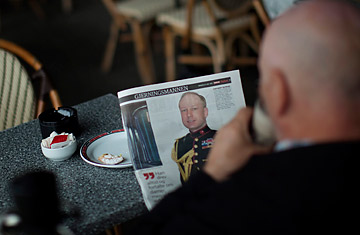
A man sitting in an Oslo café on July 27, 2011, reads a newspaper report featuring a photo of Anders Behring Breivik, the suspect of Norway's twin terror attacks
It's a human reflex, like breathing or sobbing. As dust from the bombed buildings still clogged the air and paramedics searched for survivors of the twin massacres in Oslo and the nearby island of Utoya, Norwegians and the wider world began trying to make sense of the senseless. An early template had to be discarded after the arrest of Anders Behring Breivik. The horror couldn't be pinned on the familiar lunacy of Islamic jihadism. So another narrative began to emerge, of a rarer form of madness. These had been the actions of a psychopath, a lone wolf.
Breivik's lawyer, Geir Lippestad, said that he believes his client is "insane." The authorities have commissioned two forensic psychologists to make their own assessment as investigators continue to gather evidence about the meticulous operation that enabled one man to slaughter so many. They won't need to dig too deep: the 32-year-old has admitted his actions, describing them as "gruesome but necessary," according to Lippestad. He also detailed much of the preparation in a voluminous manifesto posted on the Internet and sent to more than 1,000 e-mail addresses. Many of the recipients, each addressed by Breivik as "Western Europe patriot," are thought to be associated with far-right organizations across the continent.
Leading members of the European far right have been quick to disassociate themselves from Breivik and to reinforce the idea that he was driven not by ideology but insanity. "The manifesto of the perpetrator makes clear that this is the work of a madman. That the struggle against Islamization is misused by a psychopath is disgusting and a slap in the face of the global anti-Islamic movement," wrote Geert Wilders, chairman of the Partij voor de Vrijheid (PVV), in a statement published on his party's website. Founded in 2005, the PVV has swelled to the third largest party in the Dutch parliament on a platform calling for a halt to immigration from non-Western countries. He was "disgusted," Wilders added, to be praised by Breivik in the accused's manifesto. "Neither the PVV nor I are responsible for a lone idiot who violently distorted the freedom-loving, anti-Islamization ideals, no matter how much some people would like that."
In his manifesto, Breivik claimed to have traveled to London last year during a controversial visit to the city by Wilders and also boasted of links to a far-right group called the English Defence League (EDL). Signing himself "Sigurd Jorsalfare," after a 12th century King of Norway who led a crusade to the Holy Land, Breivik is believed to have exchanged messages with members of the EDL on the group's website. "[Breivik] was a sick individual," EDL leader Stephen Lennon, also known as Tommy Robinson, told the BBC. "You can never use terror tactics like he has used. But do we want to learn from it?"
That is a good question, no matter its source, and the answer may seem counterintuitive. The depiction of Breivik as unhinged and unaligned has been widely coupled with another idea: of Norway as a violated Eden, its innocence shattered by bomb and bullet. There is certainly some truth to that second image. Norway and the rest of Scandinavia have provided role models for other industrialized countries seeking to balance the thrum of commerce with quieter ideals of community and environmental protection. Delegations of politicians from harsher societies descend regularly on the region to admire its schools, marvel at its state-subsidized health care, wonder at its justice and penal systems, and conclude that such models would never fly back home. These are the lands of bicycling royals and doors left unlocked, of liberalism and tolerance, of unfettered sexuality and unforced sexual equality. Breivik, preening in his dress uniforms and posing with guns, doesn't fit easily into this picture.
Yet if Norway's mass killer has threatened an Eden, it is by forcing Norwegians and their neighbors and further-flung allies to look at who they really are. Adam and Eve, upon tasting the apple from the tree of knowledge, discovered they were naked. The truth for much of Europe may be more shameful. As security services have focused their attentions on the threat from Islamic-fundamentalist terrorism and mainstream politicians have pandered to anti-immigration sentiment rather than challenging its premises, ugly prejudices and inchoate fears have been allowed to flourish. Whatever the psychologists determine about his mental health — and no matter that Norwegian investigators believe he had neither accomplices nor formal ties to extremist groups — Breivik did not act in a vacuum. In the propaganda of the slick political parties, ragtag mobs and paramilitary organizations that make up Europe's far right — and the response of the establishment to this diverse movement — lie at least a few of the seeds of Norway's tragedy.
